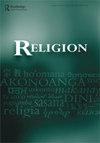Genetic Afterlives: Black Jewish Indigeneity in South Africa
IF 1
2区 哲学
0 RELIGION
引用次数: 0
Abstract
than Baal; that is another story. In 1882, Ernest Renan declared that, ‘if the growth of Christianity had been arrested by some mortal malady, the world would have beenMithraic’ (On peut dire que, si le christianisme eût été arrêté dans sa croissance par quelque maladie mortelle, le monde eût été mithriaste) (Renan 1882, 579). Is it possible that, in the same way, the world could have become Baal-ist? In various monographs, Smith has explored why this did not happen (see Smith 2001; 2002, and 2004) (cited 11), yet as one of this volume’s contributors asks, ‘What would Baal do without Mark Stratton Smith to preserve and respect his memory in a monotheistic world determined to exclude and excoriate him?’ (160). For although ‘the very name evokes idolatry, and an alternative to the true God aptly called pagan’, yet ‘Baal is “The Lord,” a perfectly serviceable monotheistic title when rendered by the Hebrew ʾādôn or the Greek kurios’ and ‘biblical writers managed to let Yahweh and El “converge” into one, with Elohim (God) the common expression, but Baal could not join the convergence [...]’ (160). Even if not necessarily his ‘favorite’ deity, Smith’s ‘deep familiarity’ with Baal has kept scholarship on this god alive and thriving: in this sense, this collection of essays is both a tribute to a prolific scholar and itself a contribution to our understanding of God’s ‘early history’ – a God whose ‘death’, as Nietzsche reminds us (and as Georg Heym also recognized), still casts a shadow over us even today.遗传后遗症:南非黑人犹太人的愤怒
比巴力;那是另一回事了。1882年,欧内斯特·雷南(Ernest Renan)宣称,“如果基督教的发展被某种致命的疾病所阻止,那么世界将是密特拉的”(On peut dire que, si le christianisme e t 疾病)。arrêté dans sa croissance par quelque maladie mortelle, le monde e t (mithriaste))。世界是否可能以同样的方式成为巴力主义者?在各种专著中,史密斯探讨了为什么这种情况没有发生(见Smith 2001;2002年和2004年)(引用11),然而,正如本卷的一位贡献者所问的那样,“在一个一神论的世界里,如果没有马克·斯特拉顿·史密斯来保存和尊重他的记忆,巴尔会怎么做?””(160)。因为,虽然“巴力这个名字让人联想到偶像崇拜,是真神的替代品,被恰当地称为异教”,但“巴力是“主”,当希伯来语的“ādôn”或希腊语的“kurios”被翻译成“耶和华”时,这是一个非常有用的一神教头衔。圣经的作者们设法让耶和华和El“融合”为一,以耶洛因(上帝)为常见的表达,但巴力不能加入融合[…]](160)。即使不一定是他“最喜欢的”神,史密斯对巴尔的“深刻熟悉”也使这个神的学术研究得以活跃和繁荣:从这个意义上说,这本文集既是对一位多产学者的致敬,也是对我们对上帝“早期历史”的理解的贡献——正如尼采提醒我们的那样(正如Georg Heym也认识到的那样),上帝的“死亡”即使在今天仍然笼罩着我们。
本文章由计算机程序翻译,如有差异,请以英文原文为准。
求助全文
约1分钟内获得全文
求助全文
来源期刊

RELIGION
RELIGION-
CiteScore
2.70
自引率
0.00%
发文量
58
期刊介绍:
RELIGION is an internationally recognized peer-reviewed journal, publishing original scholarly research in the comparative and interdisciplinary study of religion. It is published four times annually: two regular issues; and two special issues (or forums) on focused topics, generally under the direction of guest editors. RELIGION is committed to the publication of significant, novel research, review symposia and responses, and survey articles of specific fields and national contributions to scholarship. In addition, the journal includes book reviews and discussions of important venues for the publication of scholarly work in the study of religion.
 求助内容:
求助内容: 应助结果提醒方式:
应助结果提醒方式:


